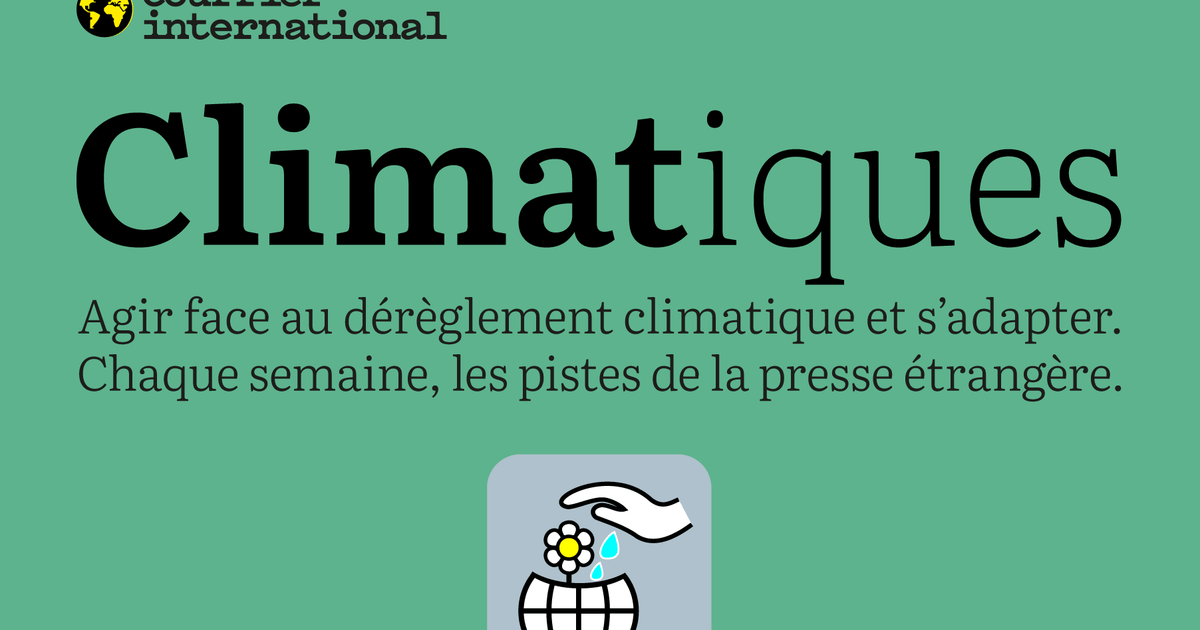Five billion air conditioners in 2050, and me and me and me

It won't have escaped your attention that it's hot, very hot indeed. Across Europe, thermometers are beyond comprehension, neurons are melting with productivity. It's "extreme heat," explains the World Meteorological Organization, "with which we must learn to live." At the café and at work, everyone has their own anti-heatwave recipe—ice cubes in front of the fan, damp curtains, ice-cold showers... " One of the greatest guilty pleasures" when "the city is sweltering under a dome of heat" is "the delicious comfort provided by air conditioning at home," says Time . – yes, because in the United States too, the heat is suffocating about “150 million Americans” right now.
But while heat waves are a problem for all of us, relying on air conditioning (at home and at work) is indeed the culprit, at least in our latitudes.
There are 2 million air conditioning systems in the world. In addition to venting hot air, they are responsible for 7% of annual greenhouse gas emissions, according to the United Nations Environment Programme . “This figure is expected to double by 2030 and triple by 2050,” when 5 billion air conditioners will be in use worldwide, the American magazine states.
The logic is implacable. Temperatures continue to rise, and so do the living standards of particularly exposed regions, particularly in Southeast Asia. “The demand for air conditioning is enormous, and so is its carbon footprint,” explains Sanjay Srivastava of the United Nations Economic and Social Commission for Asia and the Pacific. “Climate scientists speak of a vicious circle,” summarizes The Japan Times , explaining that “due to extreme heat, the increasing use of air conditioners leads to an increase in greenhouse gas emissions.”
And as if the picture weren't bleak enough, the countries with the highest demand for air conditioning "remain heavily dependent on coal-fired electricity," Bloomberg notes . However, it would be indecent to point out their "guilty pleasure."
Because while the heat is unbearable under our zinc roofs, millions of Indians, Cambodians, and Africans are suffering from deadly temperatures. According to the International Labor Organization's 2024 report , 4,200 workers worldwide lost their lives in 2020 due to heat waves. 92.9% of workers in Africa, 83.6% in the Arab States, and 71% in Asia-Pacific countries are exposed to "excessive heat" at work.
Investing in air conditioning is not out of place for them. But those who need it most "can only afford the cheapest and most energy-inefficient systems." Especially since "most of these devices use a refrigerant that's far more harmful than carbon dioxide," adds the American business media outlet.
“The planet will literally be cooked,” summarizes World Bank expert Abhas Jha, if manufacturers don't improve their equipment. The world leader in the sector, the Japanese group Daikin (29 billion dollars in revenue in 2024), is busy conquering new markets. The Japan Times reports how its economic growth and excessive temperatures make Cambodia one of the “promising” countries in the global market for fans and air conditioners, which is expected to grow “10% per year over the next five years.”
Yet, Sanjay Srivastava points out, “air conditioning can still play a role in adapting to and mitigating climate change, only if technological innovations make air conditioning more efficient and reduce its emissions.”
The International Energy Agency is making a (very) small contribution by reminding that it is useful to moderate the temperatures of air conditioners “within a range of 24 to 25°C while improving their efficiency” .
On that note, Climatiques wishes you a cool summer and looks forward to seeing you on August 28.
Annick Rivoire
Not a subscriber yet? Subscribe from €1Record in Rome
Corriere della Sera and the Italian forecasting website ilMeteo have compiled a ranking of the Italian cities most affected by climate change. Rome tops the list. The average temperature there was 14.6°C in the 1970s, compared to 16.9°C since the 2000s , explains the Milanese daily. The cause is the warming of the Mediterranean, which is responsible, among other things, for the increase in tropical nights, when the temperature does not drop below 20°C. “Fifty years ago, we counted about 10 of them per year in Rome,” explains a meteorologist. “By 2024, we have reached 79.” To learn more, click here .
Tuvalu residents ready to leave
“Nearly a third of Tuvalu's population is seeking a climate visa to live in Australia,” writes News.com.au. In 2023, the two countries signed an agreement, with the latter committing to taking in citizens of the former, who are facing the inexorable rise in sea levels caused by global warming. To obtain the precious passport to this climate exile, a draw is being held for the equivalent of 14 euros. In just ten days after its opening on June 16, the number of registrations reached 3,125. Find out more here.
Too hot, too hot
"Extreme heat is overwhelming us, fostering anxiety and aggression," notes the Tagesspiegel, which puts this phenomenon on the front page of its June 30 edition. It must be said that the Federal Republic of Germany is among the European countries affected by significant heat waves at the start of summer. The German daily thus presents a summary of scientific research demonstrating the effects of high temperatures on our mood, our behavior, and our way of understanding reality. To learn more, click here.
Naming storms to denounce
Climate activists had an idea that caught on. When the UK's Met Office held a storm-naming competition, they proposed choosing the names of "oil and gas companies to remind the public of the link between fossil fuels and extreme weather events," reports The Guardian . Hundreds of proposals arrived at the Met Office. But a representative told the newspaper that storms could not be named after private companies.
You have just read issue no. 106 of Climatiques.
Courrier International







